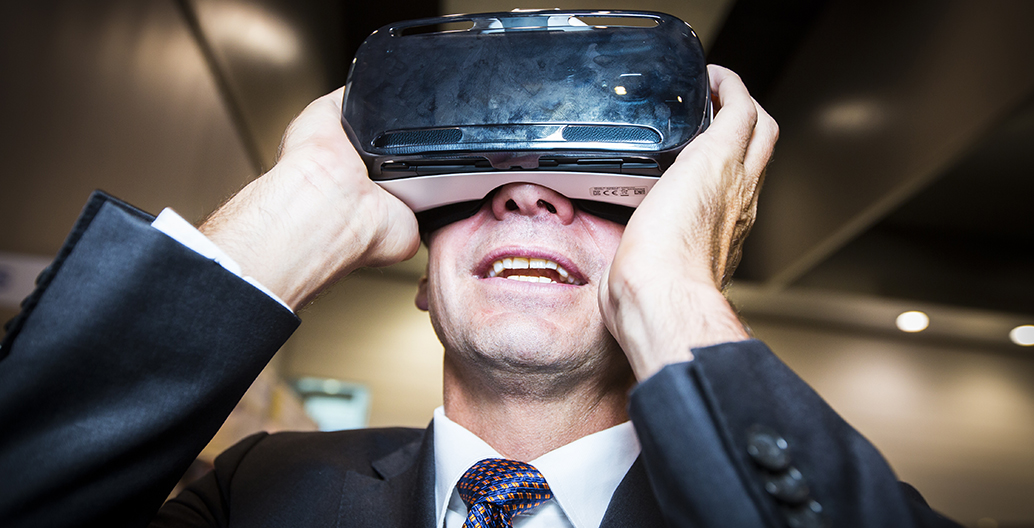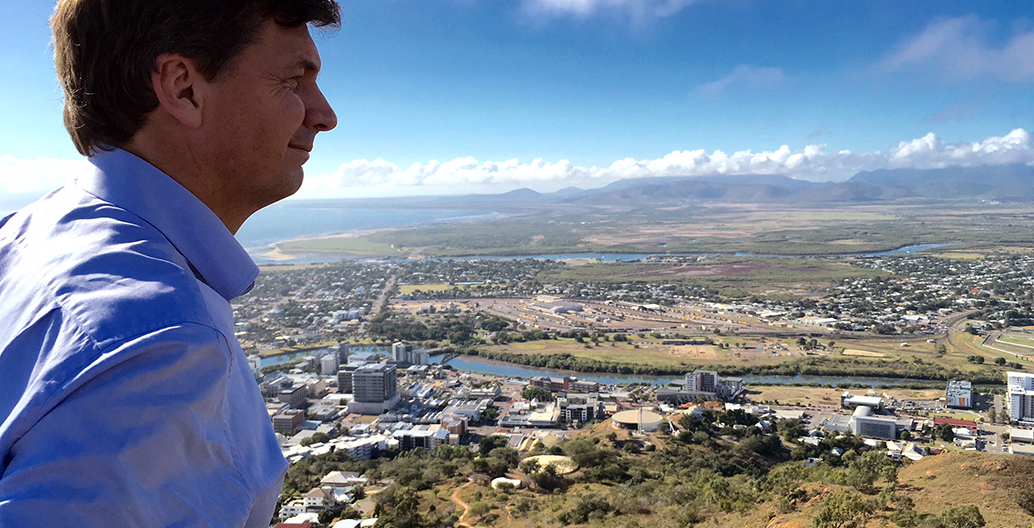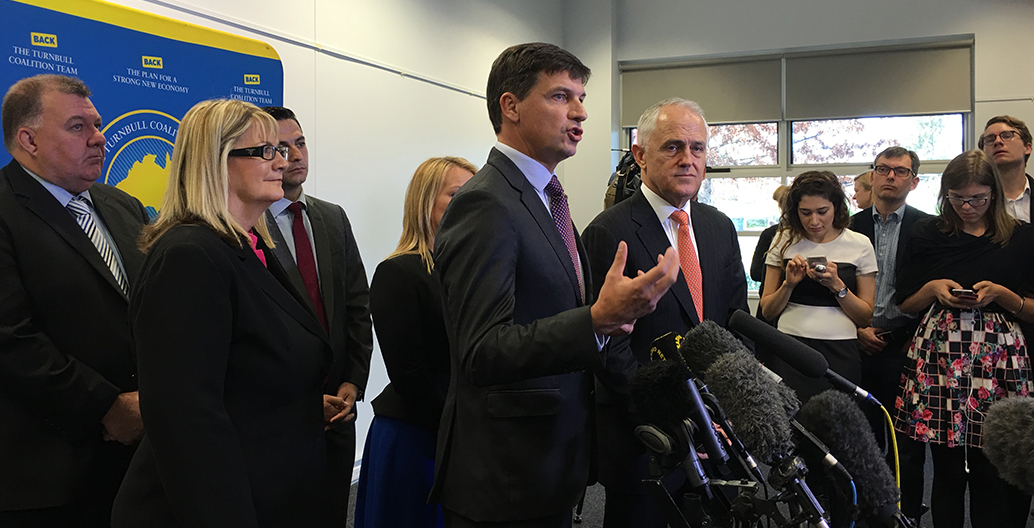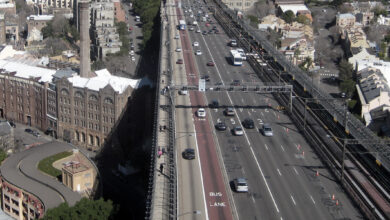
Vision check: who is Angus Taylor, Australia’s Assistant Minister for Cities?
Prior to becoming Australia’s Assistant Minister for Cities, Angus Taylor was perhaps best-known for a vocal opposition to wind farms in his rural electorate of Hume. So who is this self-professed country boy and what kind of future does he see for Australia’s cities? Paddy Manning investigates.
Malcolm Turnbull himself would no doubt agree the ‘future Prime Minister’ tag is used too often, and can easily become a political cross to bear. So it is understandable that up-and-comer Angus Taylor, the PM’s assistant minister for cities, plays a very straight bat when the tag is put to him. “I don’t give it any thought,” he says. “I’m sure lots of people have been given that label, over the years, and never become PM.”
In fact Taylor, the self-described “conviction politician” plays a straight bat to everything when we meet in the Commonwealth’s swish ministerial offices in Sydney.
Taylor refuses to be pigeon-holed. He is the onetime Tony Abbott supporter who says he has “a lot in common” with the current PM. The anti-wind campaigner who is no climate sceptic. The Oxford-trained economist and McKinsey alumni who is no neoliberal. The Liberal party reformer who is no factional warlord. Now, after a chance reshuffle in February, the country boy with the cities portfolio who sees a role for federal government intervention but also thinks “planning has gone too far”. Straight down the middle, every ball. Which smacks more of safe play than conviction… or if the conviction is there, what is it?
Taylor’s Liberal Party colleagues are still guessing. Former federal treasurer of the party and onetime state minister Michael Yabsley, who is based in the southern highlands, is a supporter who has no doubt Taylor should be in Cabinet, but acknowledges the expectation that he will be Prime Minister one day is a “double-edged sword, almost a curse”. He describes Taylor as a “laconic individual, like his father, and that can often mask a very sharp intellect, [but] he can be a bit enigmatic; he does traverse a lot of territory, in terms of what he believes in and what he stands for.”
Channelling former Prime Minister John Howard, Taylor gives little away: “My politics is a fusion of Burke and Mill, as is the Liberal Party’s politics. Too quickly people want to compartmentalize the Liberal Party in a particular way, and compartmentalize individuals. I think Howard always had the great insight that our side of politics is at its best when it combines liberalism, particularly economic liberalism, and some of the conservative traditions, and that’s very much my politics.”

Angus Taylor sees regional centres as being a crucial focus of his cities portfolio.
Whatever his political stripe, Angus Taylor is interesting – the antidote to a parliament full of party hacks. Growing up on a sheep and cattle farm in Nimmitabel, near Cooma, rural politics are in his blood. Taylor’s father Peter was a vice-president of the national farmers’ federation and once stood unsuccessfully for the Country Party. But Taylor, now 50, is more landed gentry than cow cocky: a graduate of the elite King’s high school in Parramatta and a Sydney university medallist with first class honours in economics and law, he won the Rhodes Scholarship and did his master’s degree at Oxford’s New College. His 1993 Oxford thesis used game theory to argue that small English pubs should be protected from the major brewers by limiting the number of hotels they could tie up to supply their beer. Perhaps surprisingly for a Liberal, Taylor was “arguing for more regulation, not less”. Returning from Oxford, Taylor volunteered as a staffer for NSW Liberal MP Barry O’Farrell, later Premier, who told him to have a career before politics. So Taylor spent the best part of two decades in management consulting, initially for powerhouse McKinsey, where his older brother worked. Taylor specialised in agriculture and the job took him around the world: highs included playing a key role in the formation of New Zealand dairy giant Fonterra; lows included the launch of an unsuccessful ag supplies dotcom venture, Farmshed, with Wesfarmers. Sick of the travel, and wanting to settle down in Australia, Taylor joined the boutique firm Port Jackson Partners, which counts current ACCC boss Rod Sims as alumni. In 2011, when he decided finally it was time to go into politics, Taylor went back to O’Farrell and, with the blessing of John Howard and Tony Abbott, moved to Goulburn to campaign for preselection for the safe seat of Hume, where long-term member Alby Schultz was due to retire.
Although his late predecessor dubbed him a “future PM”, local members considered Taylor a blow-in, “parachuted” into their electorate. Taylor threw everything into winning the seat, including AU$155,000 of his own money. The bruising experience turned him into a party reformer, convinced that preselection should be democratised. “As an outsider, to come into the Liberal Party in NSW, it’s actually very difficult,” Taylor says. “A big part of the difficulty is the centralization of power in the organization. I’ve been, all my life, sceptical of centralization of power. Right from my master’s thesis, which was on competition policy, through to my political experiences, I think centralization of power always creates risks of abuse of power.”
Married to ANU law lecturer and barrister Louise Clegg, with four teenage kids, Taylor lives on a small property outside Goulburn, at one end of a varied electorate that includes rural, peri-urban and suburban communities, spreading all the way into south-western Sydney – a key battleground for the Turnbull government as it tries to win back Howard’s battlers.
What comes across, from Taylor’s maiden speech to his press clippings and our lengthy interview, is an interest in nation-building. Taylor’s grandfather, William Hudson, was chief engineer of the Snowy Mountains Hydro Scheme for almost two decades, which irrigates the Riverina and is still Australia’s largest source of renewable energy. Taylor knows the history of the Snowy scheme intimately, but his enthusiasm for nation-building does not mean he is on a mission to undertake major infrastructure projects. He was a sharp critic of the Rudd government’s National Broadband Network (NBN), our last genuine attempt at nation-building, which has not fared well under the Coalition. Taylor is almost contemptuous, musing: “I’ve always felt there was more to nation building than big bucks. Good projects evolve. The Snowy wasn’t created from a grand master plan on day one, let me tell you, it evolved over time… The idea that you can come up with a nation-building project on the back of a serviette, and then demand that it be done, is just crazy. It’s insane.” Taylor has compared the Snowy and NBN, both government-run projects, and argued only the Snowy was true nation-building because (i) the benefits were properly explained, leading to cross-party support; (ii) the construction brought us together, particularly tens of thousands of immigrants from all over Europe, and (iii) through contracting, the project set new benchmarks for industrial relations (e.g. no smokos) and safety (e.g. seatbelts). It’s a reasoned rather than tabloid critique, although Taylor’s ambivalence about the NBN is confounding coming from the assistant minister responsible for digitising government services and delivering them online. Taylor has written about the potential efficiencies and compliance advantages from integration of central government datasets – although this would no doubt raise “big brother”-type fears for some. Taylor insists he supports the NBN “as it has evolved” and says as a local MP he probably spends more time in his electorate on telecommunications than any other issue.

Future PM? Angus Taylor (c) and Prime Minister Malcolm Turnbull (r) launch a City Deal at Oran Park, NSW.
Taylor has no doubt Australia can still do nation-building, only he sees it differently: “Everyone wants to hark back to those old, utility-type projects. I actually think the nation-building projects of the 21st century are our cities. It’s how we build our cities. They are now the economic engines, right? We have a service- and knowledge-driven economy, that’s where the majority of the economic activity is now. Our cities, the way they’re built, the way they’re planned, the way we invest in them, is nation-building.” This is either big-picture stuff, or it’s a series of platitudes… the answer will depend on what Taylor actually does with his portfolio. “I went into politics to have an impact,” Taylor says. “If I think, in whatever I’m doing, I can’t have an impact, I go and do something else. That’s what I get my jollies from. I guess that was part of the McKinsey culture [and] it’s certainly a big part of the Rhodes culture.” As an assistant minister he is perhaps too junior to make much of a difference, and the property industry hopes Taylor and his cities portfolio will be elevated into Cabinet.
Get Taylor talking about cities and the policy wonk comes out, citing US economists favoured by the Democrats, such as Harvard urbanist Ed Glaeser, or Barack Obama’s chief economist Jason Furman, who chairs the outgoing President’s Council of Economic Advisers. Furman argues that zoning in US cities protects or enhances the wealth of property owners in higher-value locales, locking out lower-income residents and increasing inequality. Taylor says the same argument can be made in Australia and here the conviction starts to show: “One of the biggest sources of inequality in our economy now is excessive planning of our cities, which has driven up land prices and house prices for the wealthiest. It has simply meant we don’t create enough housing in the areas where there are the most job opportunities.” The biggest losers are lesser-skilled workers in the outer suburbs where manufacturing jobs have been shed, and who have had to take low-paid or menial jobs in the city, he says. “They haven’t seen the increase in land values, they were never on a high income in the first place, and now they’re being whacked with the cost of travel to get to work… There’s a real sense in which a political and economic elite have left behind a group of people in the outer suburbs, and to some extent, the regions. I feel very strongly about that.”
For Taylor, the shock victory of President-elect Donald Trump has only underscored this growing disconnect between the political and media establishment, concentrated in the inner cities, and the people of the suburbs and regional areas. The question is whether someone as privileged as Taylor can bridge the divide.
Taylor’s deregulation rhetoric is naturally conservative and Treasurer Scott Morrison similarly called for more housing supply in a recent, widely-publicised speech to the Urban Development Institute of Australia (UDIA). Writing in Crikey, Bernard Keane asked pointedly why the Government had then abolished the National Housing Supply Council, an expert body which provided reliable data and forecasts. Taylor is unapologetic: “We don’t need forecasts, we need action… I know we don’t have enough housing, the real question is how to get it, when we’ve got a fiscally constrained environment, so we’re struggling to get enough investment in infrastructure, and we’ve got very heavy regulation at the state and local level. That’s the challenge.”
Recently a number of planners wrote an open letter to the NSW government tackling the furphy that housing supply was the answer to housing affordability. A killer slide showed housing supply had been rising for the past five years, almost in line with house prices. The counter-argument is that it has been the wrong type of supply – especially, too many inner-city apartments built for investors, not families.
Arguably, the federal government’s anti-planning rhetoric is just a continuation of the blame game, pointing the finger at the States over housing affordability. RMIT University urban policy professor Jago Dodson says that because the Commonwealth has no influence over land-use zoning, that makes it an easy policy to attack, whereas the tax benefits of owner occupation (negative gearing, non-taxation of imputed rents; capital gains exemption) which the Federal government directly controls, “barely register as issues”.
Where Professor Dodson does agree with Taylor is on rising inequality. “Australia has semi-deliberately constructed an urban system that is highly regressive in terms of social distribution and access to infrastructure, public services and amenity,” says Dodson. “The transition to a service economy and the re-centralisation of high-value employment means workers in high value jobs are locating in the inner city and getting the advantage of all the existing transport and social infrastructure while less affluent households have been pushed out the edges where employment is scarcer and public amenity is less.” The single biggest policy challenge, says Dodson, is not high-rise apartment blocks nor more land on the fringes, but how to encourage high-quality suburban infill development that does not trigger a community backlash.
The main plank of the federal government’s urban policy platform has been the “Smart Cities” policy announced in April, with its linchpin strategy of promoting new “City Deals” between the federal, state and local governments. The first, for Townsville, announced during the election campaign, included $100 million for a new football stadium – a pledge that raised a few eyebrows given the Prime Minister had ruled out funding it previously. A deal with Launceston is in the pipeline, as is a Western Sydney deal which will require Taylor to do some hard bargaining with his boss’s wife, Lucy Turnbull, head of the NSW Government’s Greater Sydney Commission. Taylor said he has had “fantastic” meetings with Turnbull, formerly Lord Mayor of Sydney, and describes her approach as “very strategic”.
Taylor has barely had six months in his portfolio, interrupted by a long election campaign, and experts say it’s too early to tell whether the City Deals policy will be effective. Taylor has said that the Commonwealth will not be an “Automatic Teller Machine,” but will want a say and a return on its investment. How that sits with Taylor’s stated distrust of centralised power, remains to be seen. Professor Dodson says the States control most of the levers that drive urban policy and what the federal government has brought to the table in the past is money. He offers faint praise for Taylor’s efforts to date: “My sense of the minister is he’s someone who has got a fairly good grasp of innovative ways of undertaking policy… I can’t say that the conversations I’ve been having with my peers have been alive with excitement at the impact he’s had.”
It may prove misguided to import the City Deals model from the UK, where there are only two levels of government and the emphasis has been on devolving decision-making as much as possible. Stephen Albin, chief executive of the UDIA in NSW, says funding state and local development through City Deals could conflict with the work of the Commonwealth grants commission. “If they can carve a niche out they might make it work,” Albin says. “The grants commission gives you more money if you have more disadvantages – it gives you money for being inefficient. City Deals could turn that on its head. The Commonwealth could link funding to targets, but you’ve got to be very careful and I think at the moment they haven’t got their heads around it.”
Taylor’s enthusiasm for planning cities is a bit surprising for an attendee of the infamous “Monkey Pod” meetings of despondent Tony Abbott supporters, after his ouster by Turnbull. Conservatives are wary of central planning at the best of times, and their natural respect for state’s rights has meant that in federal politics it has generally been Labor that takes an interest in urban affairs. True to form, Abbott ditched the cities ministry when he took power in 2013, and axed the cities policy unit inside the infrastructure department. Turnbull revived it, inside the department of Prime Minister and Cabinet, where a low-profile unit answers to Taylor.
“Let’s not assume that my views are always the same as Tony’s views,” says Taylor, who rejects the hardliner tag that has been applied to him. On climate change, for example, Taylor says he has never been a sceptic, although he has bemoaned the “new climate religion” in parliament. In fact Taylor tells me that in the family business, Growth Farms Australia, which is run by his brothers, he took an early view that the company had to take climate change into account. “I was pretty strongly challenged,” says Taylor, adding: “it’s now a consensus in that business.” Growth Farms manages properties worth $400 million in Victoria, NSW and Queensland, and Taylor says expectations for rainfall and temperature determine what the business is prepared to pay for land and how to manage it. “We progressively took views about what’s happening to the climate,” he says, “a lot of it was based on CSIRO research actually, which I think has been really quality research.” Taylor is more cautious when discussing the impact of climate change on cities, saying some will be more heavily impacted than others. In Sydney, for example, he says climate is a bigger issue in the west than in the east, “because it’s hotter, and the climate is more extreme out there. Creating green spaces, making sure that we have enough canopy, enough trees, is really important for western Sydney, and it will be a feature in our City Deal.”
For Taylor, an acceptance of climate science has not translated into support for renewable energy. Perhaps the best-known public position in his short political career to-date has been to campaign against wind farms. These are hugely controversial in his southern highlands electorate, which has more wind farms proposed than any other electorate in NSW. Taylor’s opposition was sparked in 2003 when a wind farm was built near the original family farm at Nimmitabel. Taylor has turned up at anti-wind rallies, worked on Tony Abbott’s review of the Renewable Energy Target (RET), and used a semi-regular slot on broadcaster Alan Jones’ program to rail against wind energy. Taylor is championed on the rather crazed Stop These Things website, but has not descended into the anti-scientific vitriol that has plagued the wind debate. He does not bang on about infrasound or wind turbine syndrome. Instead, he recognises that wind farms are not universally popular, slams a planning system that allows “industrial wind farms” to be built in rural-residential areas – which he likens to building factories next to homes – and zooms in on the economics of renewable energy.
“I remain a supporter of low-cost ways, the most efficient way to reduce carbon emissions and to reach our carbon targets,” says Taylor. “We shouldn’t become attached to any particular method to reduce carbon emissions, because the atmosphere doesn’t care. I’ve believed that for many, many years, well before I went into politics.” Set aside the argument that an economy-wide price on carbon is generally considered the least-cost method of achieving a given abatement target. Taylor compares the cost-per-tonne of reducing carbon pollution by buying large-scale renewable energy certificates (RECs) – mainly generated by wind energy – for roughly $90 each, with the cost of abatement under the government’s Direct Action scheme, roughly $10 a tonne. “It’s just like, why do I go to the supermarket and pay $90 for something that I could get for $10?” Taylor says. “You don’t, it’s stupid, mad.” But Andrew Bray, national coordinator of the Australian Wind Alliance, says the comparison is not very illuminating. “The uncertainty caused by Abbott’s two-year campaign against the RET, which Taylor was a big part of, pushed the REC price up to historic highs and increased the cost to consumers of renewable energy. Retailers are hesitant to commit to long-term contracts to source renewable power, because the current RET only grows to 2020 and the long term future of the scheme is not clear.”
Bray says the true cost of wind power is falling all the time and recent auctions held by the ACT government, which is targeting 100% renewable power by 2020, showed installation of wind turbines is now likely to be cheaper than new gas or coal-burning plants. “I don’t know that Taylor has updated his thinking in light of how cheap wind power has become,” Bray says, while adding that Taylor has “gone to ground on wind since Turnbull took over.”
Whether he considers himself a hardliner or not, Taylor was one of eight conservatives targeted at the last election by the activists at GetUp!. Hume is such a safe seat that the swing against him was small and he won without preferences. Taylor is unphased – he does not believe GetUp! hurt him in Hume, or even tried particularly hard – and is looking ahead, putting his support for Abbott behind him. “Bygones are bygones,” Taylor says. “I’ve never been a big believer in mid-term leadership changes. I do believe that Malcolm is pushing a fantastic agenda on the cities side, digital transformation and in many other areas for that matter.”
Which is very pragmatic for a conviction politician. Taylor is nothing if not ambitious, and marked out for higher things, but he has some thorny dilemmas to resolve if he is to reconcile his own thinking with his twin portfolios: how to plan cities and digitise government without centralising power, and how to do nation-building on a shoestring.
Paddy Manning is a writer and journalist who has worked for the ABC, Fairfax, Crikey and the Australian. He is the author of three books, including Born to Rule: The Unauthorised Biography of Malcolm Turnbull.
[To listen to audio extracts from the interview with Angus Taylor, or read the abridged transcript, click here]


